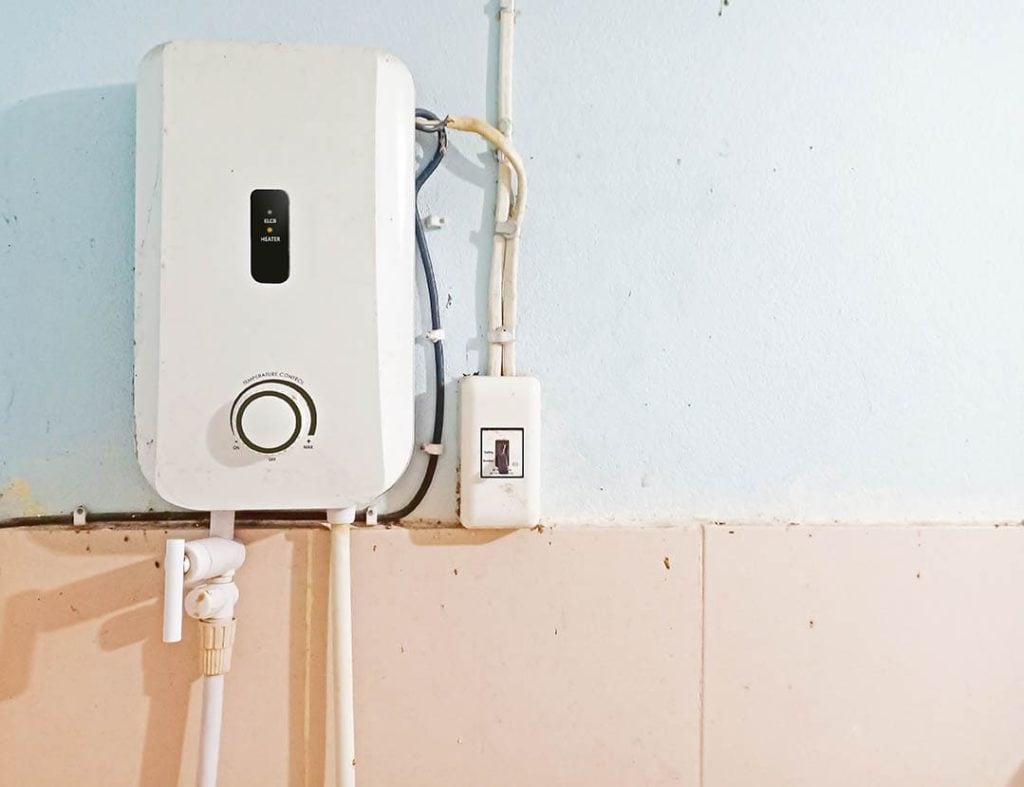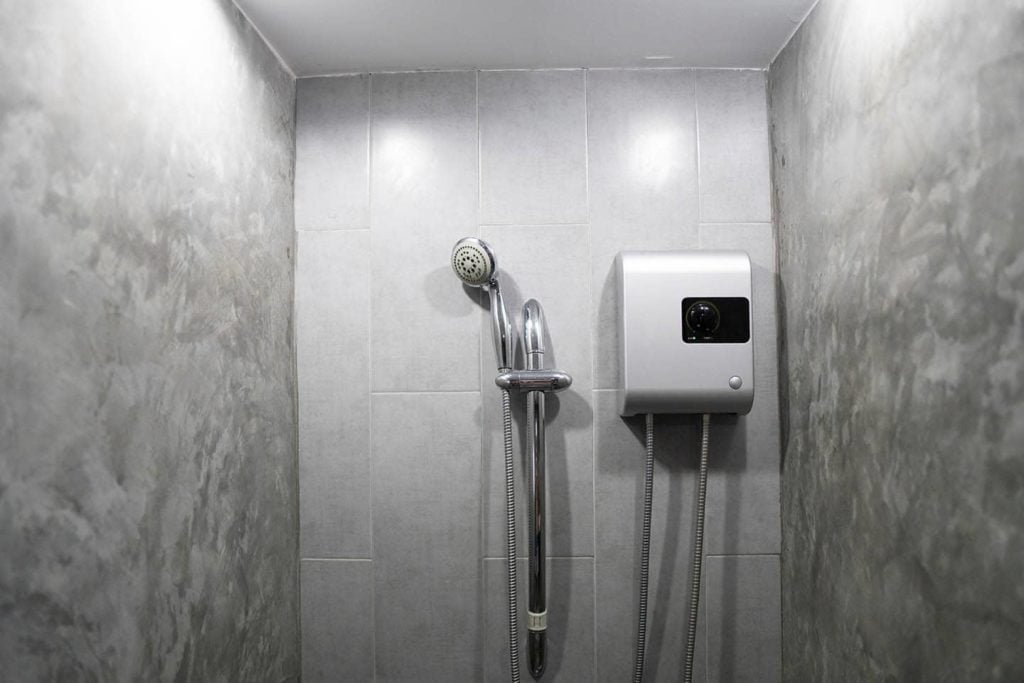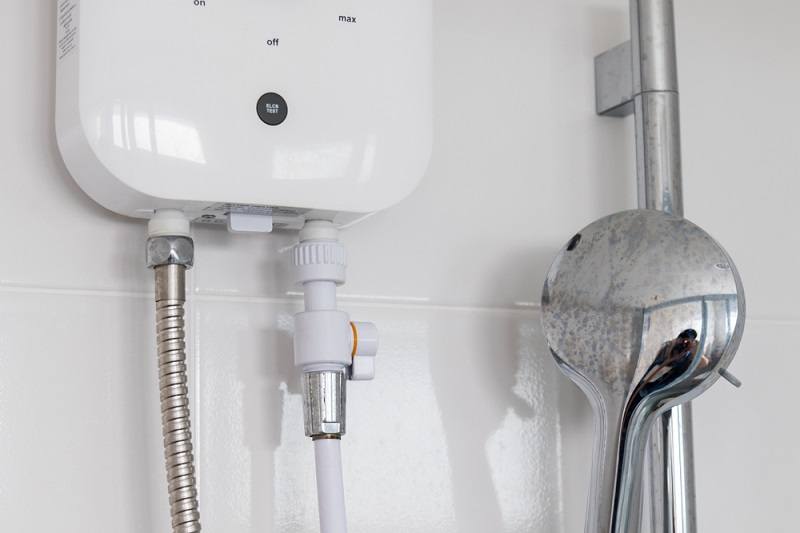How Much Electricity Does a Tankless Water Heater Use? Factors, Calculations, & FAQ
-
Jeff Weishaupt
- Last updated:

Water heaters are one of the highest energy-consuming appliances in our homes. Although modern heaters are energy-efficient, they still make up a significant portion of a home’s total power consumption. For example, some water heaters use 4,500–5,500 watts of electricity, while the rest may require 13,000–30,000 watts to run.
Whether you have a traditional boiler or a tankless system, water heaters are energy-hungry appliances. So, if you’re looking to reduce your energy bill, you must know your heater’s energy and power consumption. With this information, you can easily calculate the total cost incurred in running your tankless water use.
Don’t know where to start? This post will take you through everything to help you make an informed decision about your home’s energy consumption.
The Wattage of an Electric Tankless Water Heater

To determine the total electricity a water heater consumes, you must know how to calculate its wattage. An electric heater’s wattage is typically mentioned in its manual or user guide. If you have lost it, you can look it up on the internet or check its technical information panel.
Depending on the model, an electric tankless water heater consumes about 4,500–5,500 watts of electricity. However, some may require 13,000–30,000 watts to run.
Let’s take the example of a family of four living in a medium-sized American household. The family would need an electric tankless water heater with a heating capacity of at least 18 kW.
Remember that tankless water heaters only work for a limited amount of time in a day to generate hot water. So, they rarely operate at their total capacity. For instance, this electric water heater might require 18 kW as its start-up wattage. But it will decrease after a few seconds.
Meanwhile, a family of four usually consumes around 50 gallons of hot water daily. Therefore, if they have a traditional tankless heater, it may take more electricity to work. However, in the case of a modern, efficient tankless water heater, the family will only require 1 kW per hour of electricity daily.
Assume that the heater operates at half of its capacity on average.
- 9 kWh daily
- 270 kWh monthly
- 3285 kWh annually
Do Gas Tankless Water Heaters Consume Electricity?
Contrary to popular belief, gas tankless water heaters also use electricity to work. This applies explicitly to modern heaters with electric components, including controls, ignition systems, etc. But of course, they consume way less electricity than electric ones.
Let’s assume a gas tankless water heater uses 2 watts of standby power, reaching 25–65 watts, depending on the temperature and water flow rate. If you use the heater for 2 hours, its electricity consumption would be:
Electricity Consumption: 25 x 2 = 50 watts or 65 x 2 = 130 watts
Since it’s a gas heater, you may also have to pay for its gas consumption. But overall, a tankless gas heater would require less electricity than an electric one. Hence, less burden on your energy bill.
Factors Determining the Electricity Usage of a Tankless Water Heater
The actual electricity consumption of your tankless water heater depends on multiple factors:
- The total number of hot water outlets in your house
- The outside temperature
- Hot water consumption
If you live with your partner or a single roommate in an apartment, your water heater will use less electricity than we calculated before. Similarly, you may use less electricity if the outside temperature is mild. In contrast, if the climate is cooler or warmer than usual, you may use a little more electricity than we estimated above.
Many people also stay confused about the wasted energy factor during the calculation. Nowadays, almost all water heaters are highly efficient, consuming about 98% of electricity to heat water. So, there is no need to consider only 2% of wasted energy.
How Much Energy and Water Do Different Activities Consume?
Earlier, we only looked at the electricity a tankless water heater consumes. But what about its energy consumption in terms of baths, showers, and other everyday tasks? Assuming you use an 18-kW heater, we can assume the energy consumption in all of these tasks as below:
| Activity/Duration | Water Temperature | Energy Consumption |
| Less-power shower (10 mins) | Hot (90% capacity) | 2.7 kWh |
| Dishwashing (5 mins) | Medium (75% capacity) | 1.2 kWh |
| Bathing (10 mins) | Lukewarm (50% capacity) | 1.5 kWh |
These are just a few activities you need hot water for. If you want to perform multiple activities at once with hot water, you’d need a more efficient heater that provides continuous water flow.
Whether you have an 18-kW or a 36-kW tankless water heater, both produce hot water instantly for a maximum of 140 degrees. But the latter will produce more water in a given time than the former.
Also, if the water coming to the heater is cold, the appliance will take longer to heat the water. This means it will run at full heating capacity for a long time and consume more energy. It’s recommended to get a higher-capacity water heater in colder regions.

How to Calculate the Cost of Using an Electric Tankless Water Heater
Now that you know the total energy consumption of a tankless water heater, it’s time to calculate the money you’ll pay for using the appliance. Fortunately, the process is pretty easy, and you only need to have two values: the heater’s energy consumption and the kWh price of electricity in your area.
In the US, the average electricity price is 15.42 cents per kWh¹ as of October 2022. However, it varies depending on the state.
For instance, Washington has the lowest price as of July 2022 at 10.42 cents per kWh. Meanwhile, Hawaii is the most expensive, with 44.81 cents per kWh. So, check your electricity bill to know the current price in your area.
Let’s say you have an 18-kW tankless water heater that runs for 1 hour daily. You live in California with an average electricity price of 26.77 cents per kWh or $0.2677. In this case, your electric tankless water heater energy consumption would be:
Electricity Consumption: 18 kW x 1 hour = 18 kWh
Cost: 18 kWh x $0.2677 = $4.81
To calculate the monthly cost of the tankless water heater, you can multiply $4.81 by 30. It will give you the following:
Monthly Cost: $4.81 x 30 = $144.3
You can also calculate the cost of using a tankless water heater annually. While it’s easier to multiply your monthly cost by 12 months, we suggest you calculate it based on your daily water consumption.
There are two reasons for this. First, your hot water consumption will vary each day and month. Second, not every month has 30 days. So, here is what your annual cost estimation should look like:
Annual Cost: $4.81 x 365 = $1,755.65
Remember that these figures are only based on assumptions to give you an idea of how to calculate your water heater’s running costs. Of course, a tankless water heater can’t operate on exact power all the time.\
Final Thoughts
A tankless water heater is a modern, energy-efficient household appliance. If you live in colder climates, it is a must-have. But unfortunately, they are among those energy-hungry devices you despise after seeing your electricity bill.
Electric water consumes about 4,500–5,500 watts of electricity. However, some may even go up to 30,000 watts to run. On the other hand, gas water heaters use about 130 watts of electricity.
The cost of using a water heater depends on many factors. For example, the number of hot water outlets, outside temperature, hot water consumption, and the inlet water temperature. Consider all these things when calculating the cost of your water heater.
Featured Image Credit: Narah, Shutterstock
Contents

